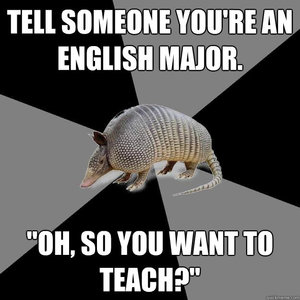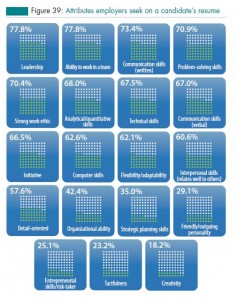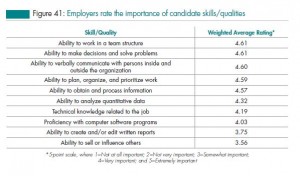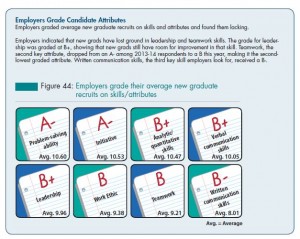Welcome to the official first week of class for ENGL 199-INT (the Internship Seminar). If you have not yet introduced yourself, please do so here (click that link).
For this week, you must
- Read the attendance post and respond to it (by 11:55pm on Sunday, March 20).
- Complete the Week 1 assignment on Compass (by 11:55 on Sunday, March 20)
Note that “Week 2” of “second eight-week” courses is Spring Break. Yes, you’ll have a Week 2 assignment on Compass. But nothing on this blog for that week since the face-to-face class does not meet.
Week 1 Attendance Post
As an English or Creative Writing major, you have no doubt heard many variations on the following themes:





The memes are wrong. Take a moment to look over the rather different graphics below. These are taken from the 2015 report of the National Association of Colleges and Employers, an organization that annually surveys businesses that recruit on college campuses.



A few things to note here:
- Technical and quantitative skills are on the list, but employers are actively seeking a much wider range of NON-technical and NON-quantitative skills.
- Written communication skills are in high demand but rare among the new graduate recruits that companies hire.
- Problem-solving, leadership, teamwork, and organization are also skills that employers value.
What does this mean for you as an English major? Look at the top 5 skills listed on “Figure 41” (the middle one up there). We asked U of I English and Creative Writing faculty to talk about how and English or Creative Writing major advances these skills. Click on the links to see their answers:
- “Ability to work in a team structure”
- “Ability to make decisions and solve problems”
- “Ability to verbally communicate…”
- “Ability to plan, organize, and prioritize work”
- “Ability to obtain and process information”
Your internship experience gives you the opportunity to apply these skills directly to non-academic situations, as do part-time jobs, RSO involvement, summer employment, volunteer jobs, and the like.
For attendance credit this week, you need to do two things:
First, respond to this post by answering these questions in a single, thoughtful reply:
(a) Among these top five skills sought by employers, which two do you think are your particular strengths? How do you know?
(b) Among these top five skills sought by employers, which two does your internship give you the most opportunity to work on?
Second, let’s acknowledge a particularly annoying feature of these top five skills: they are SO VAGUE as to be almost meaningless, but still meaningful enough that it’s hard to dismiss them out of hand. After all–if employers take them seriously as criteria for evaluating job candidates, we need to take them seriously, too.
(“Teamwork” for example is obviously important. We’ve all probably been in groups where people didn’t pull their weight. It’s annoying. But “teamwork” can mean a lot of different things. Teamwork in a rigidly hierarchical hospital operating room is very different from collaborative teamwork on, say, a grassroots political campaign. Some teams require people to arrive at consensus, other teams require people to cope well when their good ideas get shot down.)
SO, you’ll need to reply to at least one classmate’s post in order to get full attendance credit, but instead of saying something bland and pro-forma like “Great post! Sounds like you’re getting good experience!” try to use a classmate’s experience as a springboard for exploring what one of these five skills means for you and how your own personal strengths connect to it. Reply with a sentence or two about how your experience differs and reveals a different component of the particular skill, or about how you realize that you would thrive/not thrive in the internship described because your strengths for that skill tend in a different direction or…whatever comes to mind as a way to learn from your classmates’ experience about what these skills mean for you.
I’d have to say my two strongest qualities from the list are the following:
1. Communication: I am extremely (and I mean, EXTREMELY) extroverted, which means that I have a natural affinity in creating relationships with people, and making relationships requires quite a bit of communication. Communication, for me, is mostly physical (verbal/written/bodily), but it can take place in the digital world as well, which is becoming increasingly more common by the day- advantageous for people who grew up in the technology age. I’m very in tune with other’s emotions (especially in the physical world), which allows me to determine how to communicate what information I would like effectively while receiving information as close to how the person originally intended it to have been communicated. My internship at the Hope Center actually requires me to communicate a LOT with my mentor, as she gives me free reign on my assignments- I only need to communicate with her what/when/how I’m doing something. I also get to interact with a LOT of different community members, ranging in social background, which is amazing!
2. Decision making/Problem solving: I’m the type who enjoys having problems to solve- I’ve got a restless mind, so solving problems allows me to keep it exercising. I like approaching problems in the sense of, “okay, how can we turn this into something useful,” rather than thinking of it as an obstacle needing to be hurdled or a broken object needing to be “fixed.” I have found that people respond well and also allows me to be creative in spaces that might be more restricting upon first glance.
Other than communication skills, my internship also forces me to work on my planning/organizing/prioritizing… for, alas, this is a great weakness of mine. Being very holistic and free-thinking, I prefer to never have a schedule and do things spontaneously, which is hard to do in the professional world. Due to me taking 18 credit hours and being involved in several RSOs and my church (and friends!), in addition to this internship, I have been forced to use something I despise: Google calendars. I’ve had to plan my day out very carefully and using notifications to remind me of what I need to do, managing my time more efficiently and forcing myself to work on what is considered a priority.
Of the top five skills employers want to see, I would say I’m strongest in obtaining and processing information and working in a team. I can’t think of a time when these skills weren’t absolutely essential to my success both as a student and as a person serving in other capacities—as a former pre-service teacher in my field placements, as the Co-President of the National Organization for Women, as an I-Connect facilitator, and as an intern at the Women’s Resources Center. At the end of the day, my involvement isn’t just about engaging intersectional feminisms in CU or delivering content to a room full of students; it’s about giving care. Good work in my field is good caretaking, and that means constantly becoming more knowledgeable about the people I’m impacting and the context I’m stepping into and doing what I can to take care of us, including myself (because growing a sustainable movement is key when there aren’t many bodies doing the work). These two skills are my strongest because I became aware of their importance fast and needed to keep building them to stay in this work. As a job requiring me to write articles and communicate with people about the editorial process, my internship allows me to continue improving my ability to obtain and process information and to practice planning, organizing, and prioritizing work when I’m balancing several tasks for a deadline.
I’d say that my two biggest strengths in relation to the above list would be the ability to obtain and process information and the ability to make decisions and solve problems. Pursuing a career in which I could do both in some way or another would be ideal.
When I think about these skills, I also think about my current internship: writing for Smile Politely. I recently wrote a preview for a new exhibit opening at the IMC. I had to contact the local artist by email and ask a variety of questions, to which I got mammoth-sized responses from him. I was originally planning on doing a narrative-style article about the opening, but I had received so much information with regard to my questions that I changed my mind and did a straight interview style article. Still, I couldn’t very well copy and paste the questions and answers because the article would have been way too lengthy. Instead, I had to carefully reconstruct and reorganize his answers into shorter, more concise responses without sacrificing his personality or changing the meaning behind what he was saying. It would have been easy to do a complete overhaul and rewrite his answers in my own voice, but I had to make sure that I stuck to reorganizing rather than redoing and that the only changes/edits I made were for clarity purposes, not because I thought what I could do would sound better. I was very proud of how the article turned out, and the artist contacted me after it was published to thank me and express his own pleasure with it. Not only had I been able to obtain and process information, but I also took problems relevant to my article and made decisions that helped solve them.
Additionally, I think, as you said above, “teamwork” in some capacity or another is important to all employers and that’s because we’re faced with the need to work with people of all kinds of backgrounds that we may or may not agree with every day. Working as a team, though, generally means arriving at the place that is most beneficial for what you’re trying to do, and being able to be respectfully critical of others and critical of yourself and your own work despite any differences you may have with your teammates. In regards to editing, this another thing my internship has helped me with. It has helped me to avoid “marrying my words,” so to speak. Instead of getting connected to my own prose, I make sure that I have no problem hitting the erase key when suggestions or made or when I’m told that what I have doesn’t work where I initially put it. Regardless of what post-grad holds, I think this skills are invaluable to me.
In my opinion, not only are you good at obtaining and processing information, you are capable of adjusting with the information you are given. I think that’s a really important skill to obtain. It’s great to have a vision about a project, but in reality, it’s less beneficial to be in a “tunnel vision” mode. So it’s great that you see the information that is present in front of you, and then you consider what is best for the project to adjust to that!
It’s definitely hard to “murder your darlings” when writing or editing a piece, and it sounds like you’re getting some good experience with making decisions that will best advance your goals while remaining attentive to the needs of others. My experience has been a little different because I haven’t been communicating with people outside of my internship to write news items about topics related to 18th Century Studies. However, I do regularly communicate with my supervisors about my writing and get to think about incorporating feedback that way.
1a) I think my two strengths are my ability to work in a team structure and to plan, organize, and prioritize work. I love collaborating with other individuals because I am easy going and open to new ideas or changes. I know that planning and organizing is something I need in my life to keep structure to it, so I’m good at helping plan events ahead of time and organizing.
1b) Given the nature of my internship is that I’m working one-on-one with my mentor (for the most part), I have the chance to really practice and improve my verbal communication and my ability to obtain and process information. Since I’m a communication/writing intern at the College of Education, it’s mandatory that I practice on my communication skills and my abilities to obtain and process information that is given to me.
Since your and my internships seem to be similar in terms of writing and communication, I see how our skills overlap a little bit with teamwork, obtaining/processing information, and organizing/prioritizing/planning our work. However, since Smile Politely is entirely online, I’ve actually never met any of my editors in person, so where you’re getting the opportunity to develop your verbal skills by working one-on-one, I’m having to develop my ability to communicate effectively entirely through email and Google docs.
I’m really glad that you possess the ability to prioritize/organize/plan ahead of time, since I think you’re right in that this is useful, especially for college students like ourselves who are pretty much on their own. I was thinking about how prioritizing things also leads to your own, personal, emotional priorities- yes, fulfilling assignments is necessary, doing things by a certain deadline is important, but prioritizing your health, mental and physical, is also something important- I personally am TERRIBLE at self-care, and I’ve been told that many activists share this characteristic, since they’re always doing as much as they can. Letting your mentor know when you might need an extension for a personal day (ahead of time or maybe not) is important in exercising self-care, as you can’t produce quality work if you yourself at not at your best.